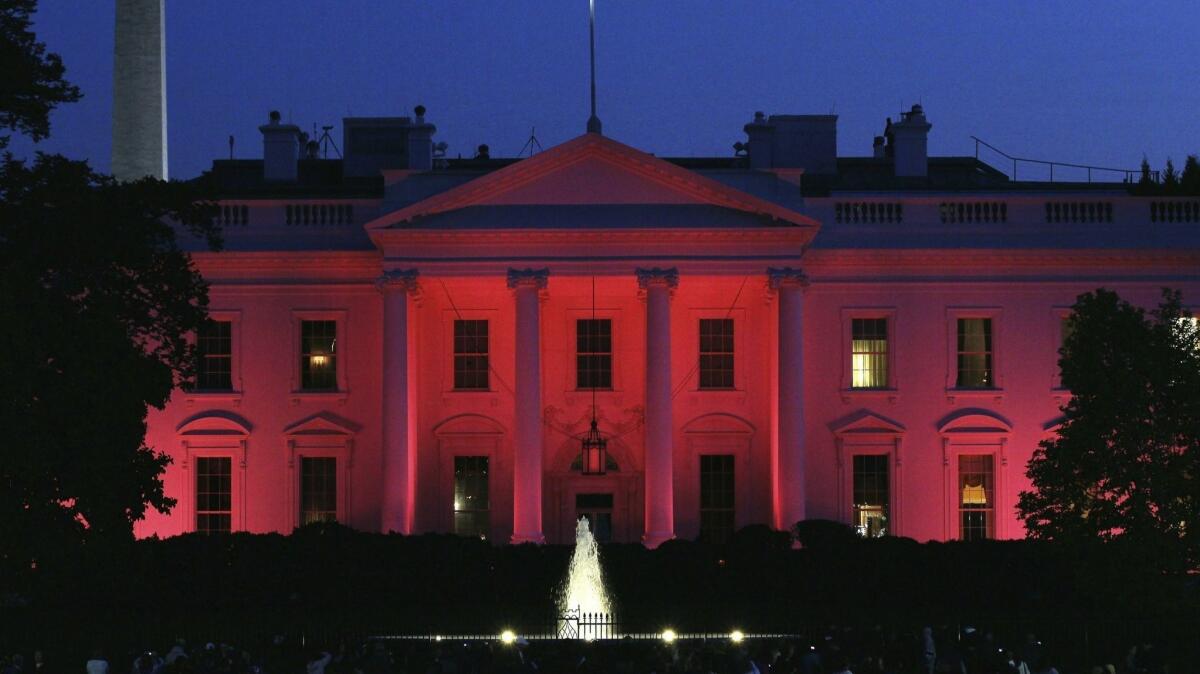Op-Ed: Breast cancer is political. Tie that up in your pink ribbon

After my double mastectomy two years ago, I had to read two terrifying things: my pathology report and my hospital bill.
The pathology report made me sink to the floor with despair; it noted multiple large tumors that had invaded my skin, and 15 underarm lymph nodes bursting with rapidly dividing cancer cells. I would require months of aggressive treatment.
The bill for my hospital stay and surgery was $173,000. But there was some good news: My insurance plan paid for all of it. For this, I thanked the Affordable Care Act, because it mandated that hospitalization — and everything else I needed, including lab tests, medication and physical therapy — be covered as part of a set of essential benefits. My cumulative medical expenses now exceed $500,000, but the Affordable Care Act also bars insurance companies from putting a lifetime cap on what they will spend. So if my cancer returns, a real possibility since I’m 33 with poor prognostic factors, I won’t have to choose between dying or going bankrupt.
These protections and benefits are now at risk under a presidential administration hellbent on repealing the Affordable Care Act or weakening it through one policy change after another until it collapses. Thousands of women and men undergoing treatment for breast cancer (and millions more who have it on record as a preexisting condition) are vulnerable. I’m scared, and so are the other patients — some as young as 20 — in my support groups. We know exactly what is at stake in the November midterm. We also know that Breast Cancer Awareness Month in October, with its onslaught of pink ribbons, is a distraction from our real needs.
The best thing anyone can do for breast cancer patients and survivors is to support candidates who will stop the GOP attack on affordable healthcare.
If breast cancer mortality rates are down, it’s due to the work of researchers developing more effective medications, not the promotional pink yogurt lids, cosmetics or athletic shoes that will be rolled in out in October as part of the annual campaign. Occasionally, participating corporations donate a fraction of their profits to breast cancer charities, but “pinkwashing” is often merely a branding endeavor.
The message itself has grown stale and mildly insulting; at this point, it would be difficult to find someone who isn’t aware of breast cancer’s existence. I join critics like Barbara Ehrenreich in viewing “Pink October” as a crass marketing ploy rather than an effective approach to saving lives. Even if a portion of our pink dollars ends up funding breast cancer screenings, the people living with the disease right now still need a way to pay for immediate care. Those of us at more advanced stages are running out of time.
According to a 2017 study, uninsured women are 60% more likely to die from breast cancer than those who have health insurance. The reason is no mystery: Without a comprehensive policy, almost nobody can afford the astronomical out-of-pocket costs of chemotherapy, radiation and surgery. Pink tote bags and T-shirts won’t remedy this, nor will cutesy campaigns on social media. But your vote might.
Since its inception, Breast Cancer Awareness Month has been deliberately apolitical, built on appealing broadly regardless of party affiliation. But this approach has become counterproductive; today, access to cancer treatment is entirely dependent upon which politicians hold power.
Enter the Fray: First takes on the news of the minute from L.A. Times Opinion »
Indeed, the best thing anyone can do for breast cancer patients and survivors is to support candidates who will stop the GOP attack on affordable healthcare. If Republicans hold onto the majority in Congress, they will absolutely vote again to gut the Affordable Care Act, ultimately rendering people with a history of cancer uninsurable. On the other hand, a number of Democratic challengers have pledged to defend and improve the Affordable Care Act, and the more progressive ones are backing Medicare for All.
Breast cancer is a political issue in ways that go beyond the battle over health insurance, however.
Planned Parenthood centers, dependent on government funding, provide breast exams and mammogram referrals. Environmental and consumer regulations protect us from known carcinogens. The fate of “Death with Dignity” laws and legislation on the state level will determine end-of-life options for the 30% of early-stage patients who eventually progress to terminal metastatic disease. Women’s health is now a partisan issue. The Democrats aren’t perfect, but they certainly make me feel more hopeful than a pink ribbon on a bottle of perfume.
We need to move on from awareness campaigns and their empty gestures, and focus instead on electing politicians who will safeguard the care of those affected by breast cancer. This October, you can skip the pink. But in November, vote blue.
Sascha Cohen is a writer and healthcare activist living in Los Angeles.
Follow the Opinion section on Twitter @latimesopinionand Facebook
More to Read
A cure for the common opinion
Get thought-provoking perspectives with our weekly newsletter.
You may occasionally receive promotional content from the Los Angeles Times.






